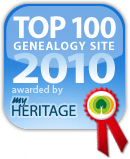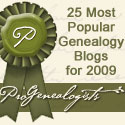When genealogists enter the names of the locations where events in their ancestors’ lives occurred, they are faced with the dilemma of how to enter place names so as to unambiguously identify the locations in both space and time.
Because the borders of Poland changed so often throughout history, genealogists may find that correctly identifying the name of the places where vital events in the lives of their ancestors occurred may be a difficult task if they attempt to enter the names of the places as they were known at the time of the events.
Many genealogists simplify the matter by entering the place names as they are known today, by entering the place names as they were known at the end of the 19th century / beginning of the 20th century (when their ancestors arrived in the United States), or simply by entering the name of the village with the nation identified as “Poland”.
Entering the place names as they are known today suffers from the disadvantage that, when the administrative divisions change again, all the place names previously entered will be incorrect. Entering the place names as they were known at the end of the 19th century / beginning of the 20th century fails to account for the fact that the place names changed during the lives of our ancestors. Entering the place names simply as Name of Village, Poland often does not provide enough information to clearly identify the place, especially when the name of the village is common, such as Nowa Wieś, Stare Miasto, or Grądi.
Many genealogists feel that the best way to identify a place in space and time is to list the place name as it was known at the time of the event. By doing so, the genealogist not only identifies the place unambiguously, but also adds valuable historic context to the event by describing the geopolitical landscape at the time of the event. And so, I have decided to take this approach in identifying the places where my own ancestors lived.
My 4th great grandfather, Tomasz Niedziałkowski, was born in the Polish-Lithuanian Commonwealth. Several of his children were born in Prussia, but his youngest child, my 3rd great grandfather Antoni Niedziałkowski, was born in the Duchy of Warsaw. Wojciech Niedziałkowski, my 2nd great grandfather, was born in the Congress Kingdom of Poland as was my 1st great grandfather, Teofil Niedziałkowski. My grandfather, Kostanty (Konstanty) Niedziałkowski, was born in the Russian Empire. My Niedziałkowski ancestors were born in five different countries even though they were all born in the same general area of Poland. These border changes provide information about their lives that would be lost if I did not record the place names as they were at the times of the events.
For this reason, I wrote several posts on how the administrative structure of Poland affected the place names throughout history. This work is still incomplete, especially for those parts of Poland that were annexed by Austria and Prussia. Nonetheless, I have described this work-in-progress to identify the place names as they were throughout Polish history in the following articles:
- Describing Place Names in the Polish-Lithuanian Commonwealth 1569-1795
- Describing Place Names in the Duchy of Warsaw 1807-1815
- Describing Place Names in the Kingdom of Poland 1815-1816
- Describing Place Names in the Kingdom of Poland 1816-1837
- Describing Place Names in the Kingdom of Poland 1837-1844
- Describing Place Names in the Kingdom of Poland 1844-1867
- Describing Place Names in the Vistula Land 1867-1915
This is just a start in my effort to correctly identify the names of the places where the vital events in my ancestors’ lives occurred, as they were known at the time of the events.
Copyright © 2010 by Stephen J. Danko




Steve, Have you written any histories of Poland, or specific areas of Poland? That would be an interesting read — as you have such a wealth of knowledge and insight into the land and people. Thanks for sharing.
Great posts! I enjoyed reading them.
Hello Steve!
I just wanted to tell you how much you’ve helped me. I methodically read each post, slowly digesting each sentence. I feel I now have a *much, much* better understanding of the fluid borders of Polish/Russian/Congress Kingdom of Poland, etc.
Your writing is crisp and clear. Your message was delivered perfectly, in my humble opinion. I am always searching for consistency – a standardization – in locations (and, really, everywhere in citations).
Now, I just have to figure out the “location pattern” for an ancestor from Obrowo, just a few miles from Prussian territory, in Russia. It took me hours to figure out he was from the Russian Obrowo. It’s all very complicated for a newcomer to Polish genealogical research.
Again, thank you for the time and energy you put into these posts. I am grateful, as I’m sure are many other visitors to your blog.
Sincerely,
-Jennifer C.
Hi Jennifer,
Thanks for the kind words. I’m glad I could help. Good luck with your genealogy adventure!
Steve
My grandfather’s ship manifest of 1911 said his father (Michael Walczak) was from Borze. My granfather (John Walczak) listed his place of birth as Wowiczko. I have tried a variety of spellings for this town, without success. I have also have not had much luck finding gr-grandfather in Borze. Do you have a LDS Film Number for Borze?
Also, my grandfathers aunt (Victoria Depczynski) said she lived in Lubewi ?? and thought on that?
thanks